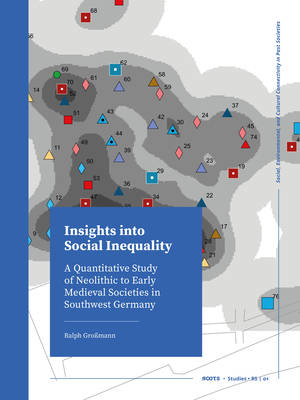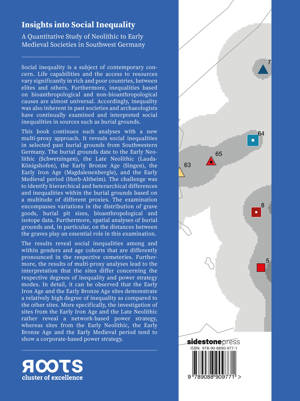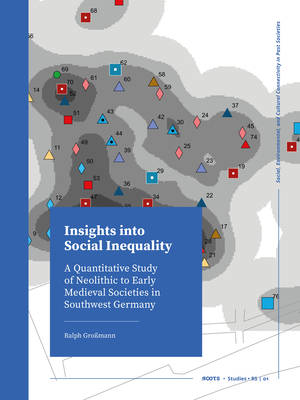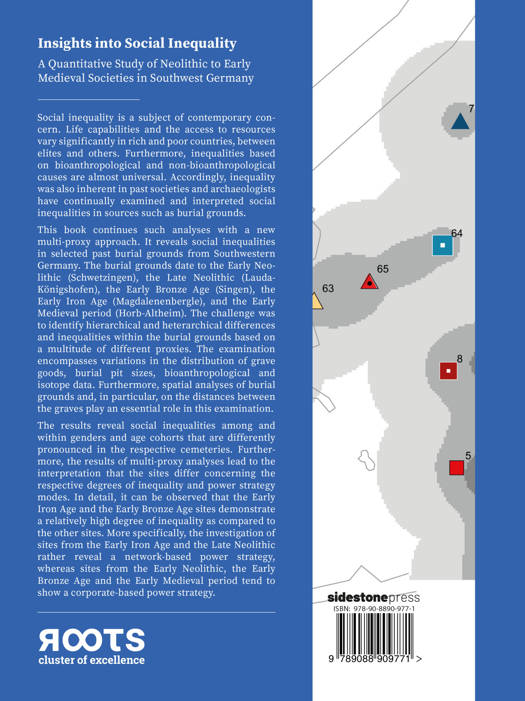
Bedankt voor het vertrouwen het afgelopen jaar! Om jou te bedanken bieden we GRATIS verzending (in België) aan op alles gedurende de hele maand januari.
- Afhalen na 1 uur in een winkel met voorraad
- Gratis thuislevering in België vanaf € 30
- Ruim aanbod met 7 miljoen producten
Bedankt voor het vertrouwen het afgelopen jaar! Om jou te bedanken bieden we GRATIS verzending (in België) aan op alles gedurende de hele maand januari.
- Afhalen na 1 uur in een winkel met voorraad
- Gratis thuislevering in België vanaf € 30
- Ruim aanbod met 7 miljoen producten
Zoeken


Insights Into Social Inequality
A Quantitative Study of Neolithic to Early Medieval Societies in Southwest Germany
Ralph Grossmann
€ 135,00
+ 270 punten
Uitvoering
Omschrijving
Social inequality is a subject of contemporary concerns. Life capabilities and the access to resources vary significantly in rich and poor countries, between elites and others. Furthermore, inequalities based on bio-anthropological and non-bio-anthropological causes are almost universal. Accordingly, inequality was also inherent in past societies and archaeologists have continually examined and interpreted social inequalities in sources such as burial grounds.
This book continues such analyses with a new multi-proxy approach. It reveals social inequalities in selected past burial grounds from Southwestern Germany. The burial grounds date to the Early Neolithic (Schwetzingen), the Late Neolithic (Lauda-Königshofen), the Early Bronze Age (Singen), the Early Iron Age (Magdalenenbergle), and the Early Medieval period (Horb-Altheim). The challenge was to identify hierarchical and heterarchical differences and inequalities within the burial grounds based on a multitude of different proxies. The examination encompasses variations in the distribution of grave goods, burial pit sizes, bio-anthropological and isotope data. Furthermore, spatial analyses of burial grounds and, in particular, on the distances between the graves play an essential role in this examination.
The results reveal social inequalities among and within genders and age cohorts that are differently pronounced in the respective cemeteries. Furthermore, the results of multi-proxy analyses lead to the interpretation that the sites differ concerning the respective degrees of inequality and power strategy modes. In detail, it can be observed that the Early Iron Age and the Early Bronze Age sites demonstrate a relatively high degree of inequality as compared to the other sites. More specifically, the investigation of sites from the Early Iron Age and the Late Neolithic rather reveal a network-based power strategy, whereas sites from the Early Neolithic, the Early Bronze Age and the Early Medieval period tend to show a corporate-based power strategy.
This book continues such analyses with a new multi-proxy approach. It reveals social inequalities in selected past burial grounds from Southwestern Germany. The burial grounds date to the Early Neolithic (Schwetzingen), the Late Neolithic (Lauda-Königshofen), the Early Bronze Age (Singen), the Early Iron Age (Magdalenenbergle), and the Early Medieval period (Horb-Altheim). The challenge was to identify hierarchical and heterarchical differences and inequalities within the burial grounds based on a multitude of different proxies. The examination encompasses variations in the distribution of grave goods, burial pit sizes, bio-anthropological and isotope data. Furthermore, spatial analyses of burial grounds and, in particular, on the distances between the graves play an essential role in this examination.
The results reveal social inequalities among and within genders and age cohorts that are differently pronounced in the respective cemeteries. Furthermore, the results of multi-proxy analyses lead to the interpretation that the sites differ concerning the respective degrees of inequality and power strategy modes. In detail, it can be observed that the Early Iron Age and the Early Bronze Age sites demonstrate a relatively high degree of inequality as compared to the other sites. More specifically, the investigation of sites from the Early Iron Age and the Late Neolithic rather reveal a network-based power strategy, whereas sites from the Early Neolithic, the Early Bronze Age and the Early Medieval period tend to show a corporate-based power strategy.
Specificaties
Betrokkenen
- Auteur(s):
- Uitgeverij:
Inhoud
- Aantal bladzijden:
- 236
- Taal:
- Engels
- Reeks:
- Geïllustreerd:
- Ja
Eigenschappen
- Productcode (EAN):
- 9789088909788
- Verschijningsdatum:
- 24/06/2021
- Uitvoering:
- Hardcover
- Formaat:
- Genaaid
- Afmetingen:
- 210 mm x 279 mm
- Gewicht:
- 1055 g

Alleen bij Standaard Boekhandel
+ 270 punten op je klantenkaart van Standaard Boekhandel
Beoordelingen
We publiceren alleen reviews die voldoen aan de voorwaarden voor reviews. Bekijk onze voorwaarden voor reviews.










